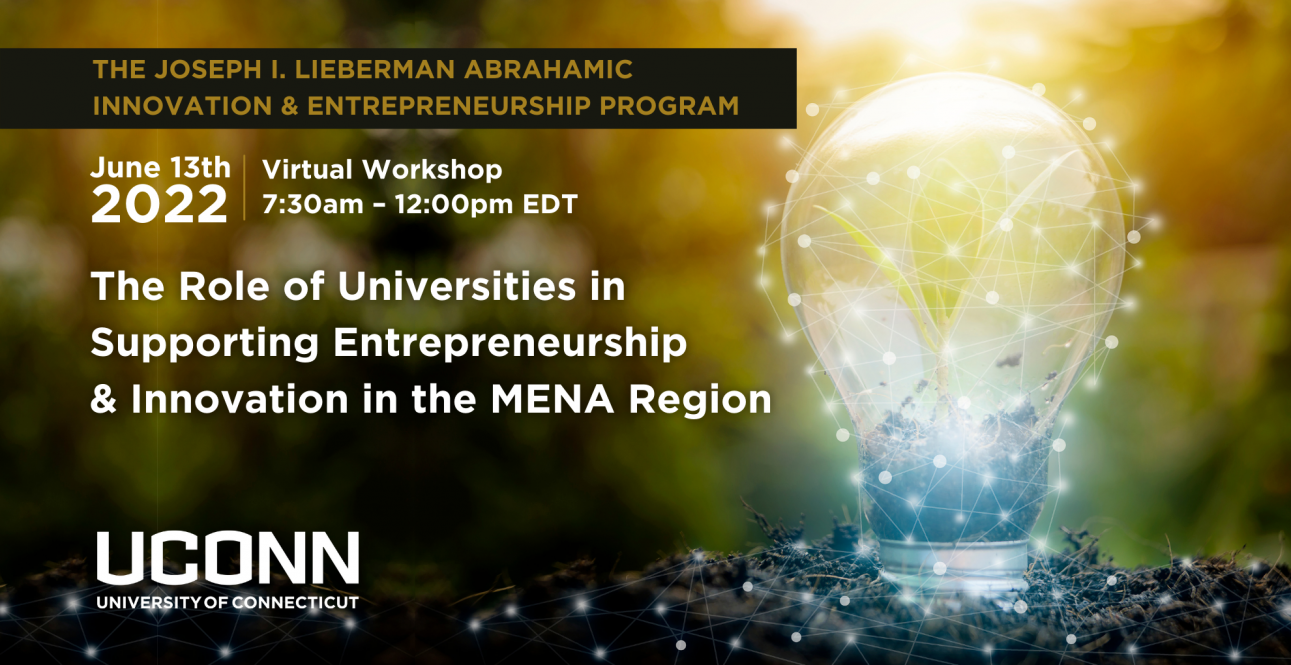On Monday, June 13th, the University of Connecticut Abrahamic Programs for Academic Collaboration in the MENA Region and the Peter J. Werth Institute for Entrepreneurship and Innovation held the Joseph I. Lieberman Abrahamic Innovation & Entrepreneurship Program Workshop.
The long-term mission of The Lieberman Program is to integrate universities more fully into the entrepreneurial and innovation ecosystems in the Middle East North Africa (MENA) region and to connect them with Connecticut as well. This will be achieved by building a community of leading entrepreneurial universities, creating fruitful dialogue and collaboration between academics, the business community, and policymakers while also contributing to peace-making in a region still suffering from conflict. In doing so, universities can be empowered to increase capacity to produce innovative research that supports economic growth and more equitable development.
The Abraham Accords, signed in 2020, formalized relations between Israel, Bahrain, the United Arab Emirates, Morocco and Sudan, paving the way towards increased regional economic integration. Speaking to the value of the Lieberman Program, Vice President for Global Affairs Dan Weiner said, “we are proud and humbled that the UConn Abrahamic Programs initiative was born before the Abraham Accords were established. We had no idea that the Accords were coming, but they validated what we are doing and provide further proof of concept.”
In his opening remarks, former Connecticut Senator Joseph Lieberman stated his goals for the program, “I have always wanted to essentially do two things. One is in some ways to try to create something in my hometown [of Stamford] that mattered particularly to the people there. And the second obviously was to try to do something that was a continuation of work that I did in my 24 years in the U.S. Senate. This idea that the University of Connecticut has come up with really perfectly does that with this initiative regarding entrepreneurship and innovation. In this case, the role of universities in both creating economic growth in individual countries, but in fostering cooperation and collaboration between the countries in the region, you might say the Abraham Accord countries, plus others, who I’m very pleased to represent in this meeting today. So I’m excited about this, because I think there’s real potential… We need to develop programs that will create opportunities for collaboration among the countries in the MENA region to deepen the ties between the countries so that this remarkable breakthrough, the Abraham Accords will essentially be permanent because it will be of such value to all the member countries. That’s my vision and my hope for this program that we effectively begin today.”
The workshop included scholars, university leaders, entrepreneurs, investors and representatives from non-governmental organizations from Egypt, Iraq, Israel, Jordan, Morocco, Palestine, Turkey, the United States and the United Kingdom. Over four sessions, university representatives highlighted their ability to spur cross-national entrepreneurship and innovation to support inclusive economic development, peace, and cooperation in the region. Participants examined case studies and explored common challenges and opportunities for interfaith and cross-border collaboration. A recurring theme noted by participants was the challenge of university-based startups to overcome the so-called “Valley of Death” period in which an organization has begun operations but has not begun to generate revenue.
“Universities throughout the world are places to think, dream, imagine, explore and innovate,” said Weiner. “We are interested to learn about how universities in the MENA region can more effectively support innovation and entrepreneurship and emerging start-up ecosystems while also empowering historically marginalized groups, including young people and women.”
A follow-up workshop is scheduled for October to be held in conjunction with Stamford Innovation Week. The Joseph I. Lieberman Abrahamic Innovation & Entrepreneurship Program is made possible by the generous support of Point 72 Asset Management and the Gladstein Family.



